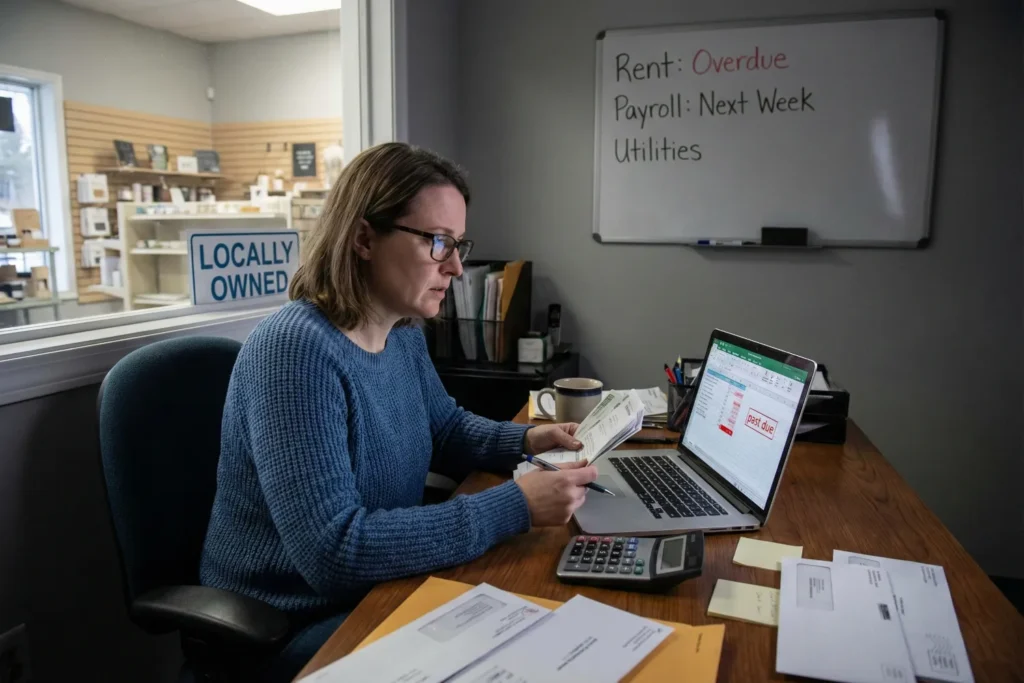Small businesses in Australia employ over 5 million people and represent 97% of all operating businesses. Yet most Aussies don’t realise how much these local operators influence their local economies.
If you’ve ever wondered why your neighbourhood cafe or tradie provides more than just convenient service, you’re not alone. Many people underestimate the impact of small businesses on growth, job creation, and the flow of money through communities.
After covering hundreds of Australian small businesses and their connection to the world economy, we’ve seen how these operators power employment, innovation, and local prosperity. And we’re about to share all those observations with you in this article.
Here you’ll see:
- What defines a small business in Australia
- The number of small businesses operating across the country
- The economic roles these businesses perform
- Major challenges facing business owners
- The government supports available to help them succeed
Let’s find out why small businesses remain essential to Australia’s economic future.
What Is a Small Business in Australia?

In Australia, a small business typically has fewer than 20 employees or generates an annual turnover of under $10 million. Usually, Australian businesses follow a range of official standards depending on which government agency handles the classification.
Put simply, you need knowledge of both employee counts and revenue thresholds because different agencies use different measures for their own purposes. For example, the ABS applies one definition, while tax offices might use another when determining eligibility for business support programmes.
Take a look at how these classifications work.
Number of Employees
Most Australian agencies count businesses with fewer than 20 employees as small businesses. The ABS generally relies on this employee measure while collecting statistical data about business activity nationwide.
It’s because workforce size offers a simple way to understand how a business operates day-to-day. For instance, a café with five employees runs differently from a retail chain with 500 staff members across multiple locations.
So in a company, employee counts can reflect management structure, operational complexity, and the resources needed to keep things running.
Annual Turnover Threshold
Revenue thresholds offer an alternative way to classify businesses when employee numbers don’t tell the full story. Many agencies use annual turnover figures, typically under $10 million, to identify small business operators.
This approach works well for certain business models. Like when an online retailer might generate substantial revenue with just three employees handling logistics and customer service.
When agencies need to assess business size for tax concessions or grant eligibility, they’ll choose either employee count or turnover, depending on what they’re measuring.
Why Definitions Differ Across Australian Businesses
Australian businesses can fall into different categories depending on which agency evaluates them.
It’s because different government agencies need different measures depending on what they’re trying to regulate or support. Generally, tax agencies care more about turnover when determining concessions, while employment programmes focus on workforce size for their classifications.
So it’s possible that a business with 15 employees and $12 million in annual revenue qualifies as small under ABS standards but might not qualify for certain tax breaks.
Differences Between Small and Large Businesses
The differences between small and large businesses go well beyond just employee numbers or revenue figures. That’s because business size affects how decisions are made, what resources you can access, and how complex your daily operations become.
To give you an idea, a small café with three staff members makes decisions faster than a retail chain managing hundreds of employees across different states. The owner can adjust the menu or change suppliers within days, while larger businesses need approval from multiple management layers.
This table shows how organisational scale influences everything in a business:
| Aspect | Small Businesses | Large Businesses |
| Organisational Scale | Fewer management layers and smaller teams | Multiple departments and layered hierarchies |
| Decision-Making | Often led by owners or small leadership groups | Shared across multiple management levels |
| Access to Resources | More limited access to capital and internal systems | Broader access to capital, infrastructure, and systems |
| Operational Complexity | Less complex internal processes | More complex operations and compliance requirements |
These structural differences explain why small businesses can pivot quickly when market conditions change. The fewer the approval layers, the more owners can test new ideas, respond to customer feedback, and adapt their operations without waiting weeks for corporate sign-off.
That flexibility becomes especially valuable when you’re competing against larger operators with deeper pockets but slower decision-making processes.
What Types of Small Businesses Operate in Australia?

Australia’s small businesses operate across every industry and provide services that span professional consulting, hospitality, and retail. They include sole traders, partnerships, proprietary companies, family enterprises, and home-based operations.
Here’s how each structure works:
- Sole Traders: They’re individual business owners who operate under their personal name and manage all aspects of their business independently. This structure suits freelancers, consultants, and tradespeople who want simple setup processes and direct control over their operations without partners and shareholders involved.
- Partnerships: Partnerships are common in professional services like accounting firms and legal practices. It allows business owners to combine skills, resources, and capital while sharing the workload and financial risks.
- Proprietary Limited Companies (Pty Ltd): Many family businesses and growing operations choose this structure because companies can raise capital more easily. They’re basically separate legal entities owned by shareholders that protect personal assets from business liabilities.
- Family-Owned Businesses: These are operations where family members prioritise long-term stability over short-term profits, with knowledge and values passed down through generations. Family enterprises account for a significant portion of Australia’s small business landscape across retail, hospitality, and manufacturing sectors.
- Online and Home-Based Businesses: Operators run their business remotely without physical shopfronts, selling products and services through websites and digital platforms. This model is popular among e-commerce retailers, digital marketers, and service providers who value flexibility and reduced operational expenses.
The diversity of business structures reflects different operational needs, ownership preferences, and tax obligations. Each structure offers different advantages depending on your business goals and operational preferences. Either way, these business types support local economies in metropolitan suburbs and regional towns across the country.
How Many Australian Small Businesses Are There?

Australia has approximately 2.6 million small businesses, according to the latest ABS data from mid-2025 (this figure uses the standard definition of businesses employing fewer than 20 people).
The 2024 reporting period shows continued growth in small business numbers despite economic pressures like rising costs and supply chain disruptions.
Now let’s look at what these numbers actually mean for the business landscape.
Share of Small Businesses Among Australian Businesses
Small businesses represent roughly 97% of all operating businesses nationwide. The ABS classification standards reveal just how dominant small enterprises are across Australia’s business landscape.
Walk down any street in Melbourne, Brisbane, or Perth, and nearly every shopfront, office, and service provider you see falls into the small business category. This proportion demonstrates the sheer scale of small business operations compared to larger corporations.
The remaining 3% includes medium and large businesses that employ over 200 people. Those larger operators get more media attention, but small businesses outnumber them by a huge margin across every Australian industry.
Now that you know how many small businesses operate today, let’s look at how that number has changed over recent years.
Changes Over Time
The number of businesses in Australia grew by a net total of 327,394 in the 2021-25 business years. This growth pattern shows consistent expansion despite economic disruptions, including pandemic lockdowns and supply chain pressures. Thankfully, small businesses in Australia proved resilient even when trading conditions got tough.
However, regional areas experienced slower growth rates compared to metropolitan centres during this four-year period. For example, cities like Sydney and Melbourne saw stronger increases in new business registrations, while country towns faced challenges attracting entrepreneurs and maintaining existing operations.
When you understand these numbers, it gives you a clearer idea of what small businesses contribute to the economy.
What Are the Roles of Small Businesses in the Australian Economy?

Small businesses provide employment for millions of Australians while generating economic activity and supporting local communities (that’s more than just selling products and services). They’re basically the engine room of Australia’s economy, as they operate in every suburb and regional centre nationwide.
Let’s look at the specific ways these businesses drive growth.
Employment Contribution
Small businesses create jobs in every corner of Australia. In our experience covering hundreds of Australian small businesses, we’ve seen how these operators provide jobs for over 5 million Australians across hospitality, retail, construction, and professional services.
These business owners commonly offer part-time, casual, and entry-level positions that support workforce participation. Eventually, they create pathways into the workforce, with beginner roles like café employees and apprentice tradies.
Economic Activity
Every time a small business makes a sale, that money ripples through the entire economy. These businesses generate goods and services that contribute billions to the national GDP annually.
Their operations drive consumer spending, create supplier relationships, and circulate revenue through local economies. Like when a Melbourne restaurant buys produce from Victorian farms, that single business supports multiple other operations.
This way, widespread small business activity maintains economic movement across suburbs, towns, and regional centres. The value these operations create extends beyond their own revenue because money spent with small businesses ends up staying local.
Local Community Impact
Micro businesses keep money flowing within the communities where they operate rather than sending profits interstate. That’s why regional areas depend heavily on small enterprises for employment and essential services.
Plus, business owners who live locally remain committed to their communities in ways corporate managers rarely match. For instance, their businesses support local infrastructure, including schools, healthcare facilities, and public amenities. And communities recognise the value these operators bring beyond just economic transactions.
Innovation by Small Business Owners
Small business owners can test new ideas faster. Oftentimes, corporate teams stay stuck in approval meetings. Unlike them, small operators can develop new products, services, and delivery methods without navigating lengthy corporate approval processes.
What’s more, a smaller scale allows rapid adjustments based on customer feedback and emerging market opportunities. Ultimately, customer insights help small businesses innovate faster because owners interact directly with buyers.
Also, this innovation often addresses specific community needs that larger businesses overlook. Say a bakery owner who chats with customers daily learns exactly what new products people want.
Competition With Larger Businesses
Speaking from our experience, small businesses often increase consumer choice by offering alternatives to established brands and retail chains.
Eventually, this competition forces all businesses to improve service quality, adjust pricing, and respond to customer preferences. This way, small businesses often win customers by focusing on personalised service that larger operators can’t match.
What Are the Biggest Challenges for Australian Small Businesses?

Australian small businesses commonly face cash flow problems, rising costs, staffing difficulties, compliance requirements, and competitive pressure.
These challenges affect daily operations by limiting resources, increasing administrative burden, and reducing profit margins. Business performance suffers when owners can’t maintain stable finances, attract quality staff, and compete effectively with larger operators.
These are the five major challenges you’ll have to constantly juggle when running a small business in Australia.
Cash Flow Issues
From what we’ve observed, cash flow problems kill more small businesses than any other single issue. For example, inconsistent customer payments and fixed expenses like rent create gaps between incoming and outgoing cash.
Sometimes, late invoice payments force businesses to delay supplier payments and reduce operational spending. This cash flow pressure limits the ability to purchase inventory, hire employees, and invest in equipment.
Unfortunately, this is where most people go wrong. They focus solely on revenue without monitoring when money hits the bank account.
That’s why business owners must manage cash flow carefully because even profitable operations can face financial difficulty between customer payments. We suggest building savings to protect against payment delays and help secure your business during slow periods.
Rising Operating Costs
Operating costs have jumped significantly over the past few years, squeezing profit margins. Especially the increasing expenses for rent, utilities, insurance, and supplies have reduced what small businesses keep as profit.
Our research into small business expenses showed that energy costs and commercial lease rates place particularly heavy pressure on hospitality and retail operators. And these fixed overheads often leave little room to cope with unexpected cost increases or downturns.
Staffing and Workforce Issues
Finding and keeping good staff has become one of the toughest challenges today. This difficulty in attracting qualified candidates and retaining experienced employees affects service delivery and business capacity.
Particularly, skills shortages in trades, hospitality, and healthcare reduce productivity and prevent businesses from accepting work. On top of that, training new team members creates costs that eat into tight budgets.
At the end of the day, workforce pressures affect both productivity and mental health outcomes for owners working extra hours.
Regulatory and Compliance Requirements
Keeping up with regulations can feel like a full-time job on top of running your business. To give you an idea, small businesses must navigate tax obligations, workplace laws, licensing requirements, and consumer act compliance.
These compliance demands consume time and often require professional advice that increases operational costs, too. This process of staying informed about changing rules requires owners to spend hours reading updates. Which is why business owners typically manage these obligations themselves or pay accountants for help.
Competition From Other Businesses
Small businesses have to compete against larger operators with deeper pockets every day. And this competition from other businesses includes larger retailers, online platforms, and franchises that access better pricing.
Established businesses often use brand recognition and advertising budgets to attract customers. So staying ahead requires constant focus on customer needs and market changes. Which is why small businesses rely on service quality to compete.
These challenges might sound overwhelming, but Australian governments offer several programmes designed to help small businesses navigate exactly these issues.
What Government Support Is Available for Small Businesses in Australia?

Australian government programmes provide grants, tax concessions, financing options, advisory services, and digital assistance for small businesses across Australia. These support programmes target specific challenges like startup costs, technology adoption, and skills development that Australian small businesses face daily.
Here’s what’s available for small businesses in Australia:
- Small Business Grants: Government agencies offer free grants that help businesses invest in equipment, training, and expansion without repayment obligations. Programmes like this usually provide funding for innovation projects, digital tool adoption, and workforce development across different states and industries.
- Tax Concessions: Small businesses can access tax breaks, including instant asset write-offs and simplified depreciation rules. These concessions reduce tax bills when you purchase equipment, vehicles, and technology for business operations.
- Loans and Financing Programs: Government-backed loans offer lower interest rates and flexible repayment terms. Usually, they’re for equipment purchases, working capital, and business contracts that need upfront investment. They help small businesses secure capital when traditional banks won’t approve financing
- Advisory and Mentoring Services: Free advisory services connect business owners with experienced mentors. You can speak directly with advisors who understand local market conditions, while network opportunities help owners build relationships through industry events. They also provide personalised advice on operations, marketing, and growth strategies.
- Digital and Innovation Support: Programmes assist businesses in adopting new technology and staying up to date with digital trends. The support has courses like training on online marketing tools, e-commerce platforms, and cybersecurity practices that protect business operations.
Government support extends to helping small businesses prepare for competitive pressures from larger operators. These programmes exist because governments recognise how essential small businesses are to Australia’s economic health. You can visit business.gov.au to explore available programmes and register for assistance that matches your specific needs.
Small Businesses Shape Australia’s Economic Future
Small businesses drive employment, innovation, and community prosperity across metropolitan and regional Australia. These operations create jobs for over 5 million people while contributing billions to the national economy each year.
At the end of the day, small businesses remain the backbone of how Australia generates wealth, creates opportunities, and maintains competitive markets. And they continue growing nationwide despite challenges like cash flow pressure and rising costs.
Ultimately, business owners who stay informed about available government support and adapt to changing market conditions thrive long-term. The future of Australia’s economy depends heavily on whether small businesses can access the resources, knowledge, and assistance they need to succeed in increasingly competitive environments.If you need more resources on supporting and growing small businesses in Australia, visit Australian Business Magazine for practical guides and up-to-date insights.
